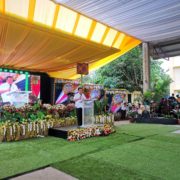
General Santos City — The Department of Education (DepEd) underscored the important role of various stakeholders as partners in Oplan Kalusugan (OK) sa DepEd to help promote and provide Filipino learners with sustainable holistic school health and nutrition programs toward healthier behavior and better learning outcomes.
In a message read by Undersecretary Diosdado San Antonio during the national kickoff of the OK sa DepEd in Banisil Central Elementary School, General Santos City on July 24, Education Chief Leonor Magtolis Briones expressed her gratitude to the local government, and partners and stakeholders from the non-government, business, and civil society organizations for their unwavering support to DepEd’s various programs and reforms: “With 27 million learners and 800,000 teachers across the country, the Department could not carry out its constitutional mandate to provide every Filipino with access to quality education without your help.”
OK sa DepEd, a convergence of the Department’s health programs, plans, policies, and activities for effective and efficient implementation, focuses on the major school health programs such as: School-Based Feeding Program (SBFP); National Drug Education Program (NDEP); Adolescent Reproductive Health Education (ARH); Water, Sanitation, and Hygiene in Schools (WinS); Medical, Dental, and Nursing Services; and the School Mental Health Program.
Undersecretary for Administration Alain Del Pascua likewise highlighted the collaboration to ensure the implementation of health and nutrition programs to maintain and improve the health of school children and personnel: “Hindi natin kayang i-implement lahat ito nang walang tulong ang Department of Health, local government unit (LGU), at ‘yung iba’t-ibang organizations na partners natin. We need all the doctors, we need all the dentists, the nurses, the nutritionists, the ophthalmologist, and all health professionals to implement this program in order for us to address the health needs of our school children.”
Ways forward
Pascua bared the Department’s plans to improve the delivery of health and nutrition programs for learners and personnel such as the construction of about 2,000 school clinics in all towns nationwide starting this year, possibly in central elementary schools, in towns without municipal clinics, or in areas far from existing clinics. To support the operation of the said clinics, Pascua said he will request the Department’s Curriculum and Instruction strand to deploy senior high school (SHS) students enrolled in health-related tracks to serve as clinic aides as part of their immersion program.
Another immersion program for SHS students, specifically those under tracks related to food and beverages, is preparing nutritious food to be distributed to schools for the SBFP.
To reach more schools and serve more learners, DepEd will likewise propose the provision of mobile clinics. Pascua added that the Department is also looking into requesting for doctors, nurses, and dentists in schools and augmenting the delivery of potable water in every school.
Finally, Pascua saluted the city government of General Santos, under the leadership of Mayor Ronnel Rivera, for providing 15 dental chairs to schools in the city as part of its health-related program.
—
Stay updated with news and information from the Department of Education by visiting their website at https://www.deped.gov.ph.






